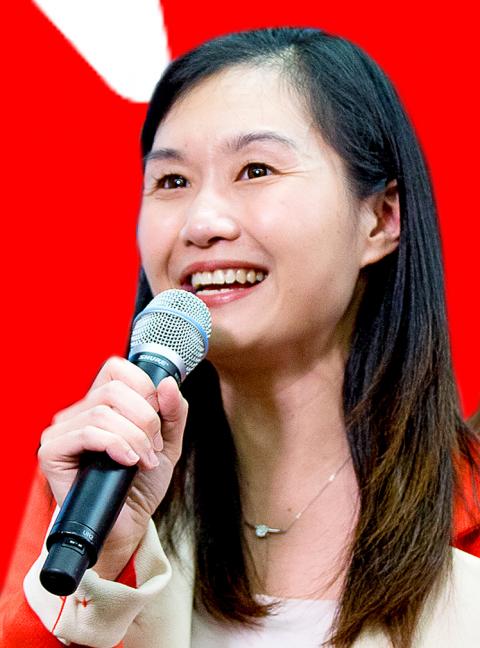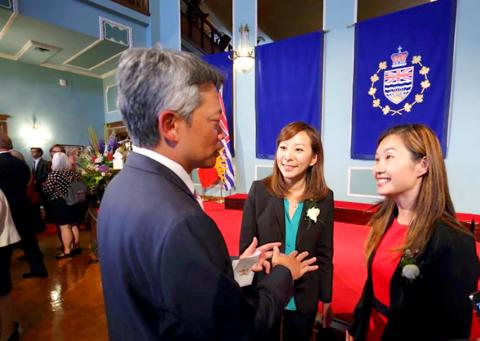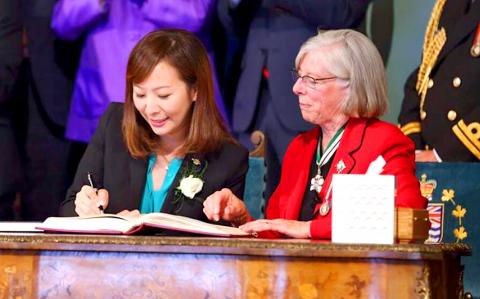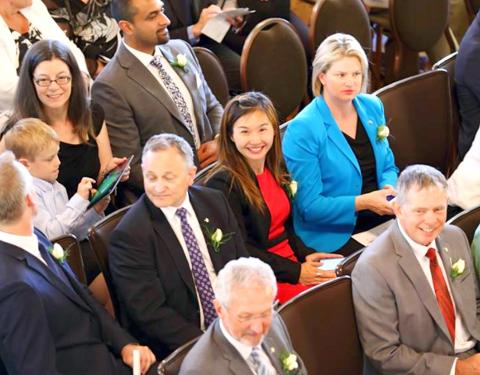Watching her father work long hours as a former Taichung city councilor, the last thing Katrina Chen (陳葦蓁) wanted to be was a politician. It was normal to watch him rush off at odd hours such as 2am to intervene in traffic accidents. Visitors seeking assistance filled his office on the ground floor of their family home and the phone could go off at any hour.
“My dad was in poor health because of all the work campaigning. He did not spend a lot of time with us. Even my mom sacrificed a lot of her time just helping out my dad,” Chen recalls in her sparsely furnished new office a few days before her official swearing-in as member of British Columbia, Canada’s Legislative Assembly and minister of state for child care.
MAKING HISTORY

Photo courtesy of New Democratic Party
Chen and fellow New Democratic Party (NDP) candidate Anne Kang (康安禮) made history on May 9 when both became the first Taiwan-born members of British Columbia’s legislative assembly. It was a moment of pride for the western province’s sizable Taiwanese immigrant communities presiding mainly in Vancouver, Burnaby and Richmond.
The two are serving different Burnaby communities after a contested election that ousted the ruling British Columbia Liberal Party after 16 years in power. NDP leader John Horgan also handed Chen a post in his cabinet as the minister of state for child care and designated Kang as parliamentary secretary for seniors.
Chen’s career path did not come without challenges, starting with being raised in a “high-discipline” family in which her parents physically punished her to instill manners. But as long as she demonstrated good character, they allowed her to explore her interests in literature, music and English. Struggling with the Taiwanese education system and the college entrance exams, a 17-year-old Chen moved to Canada in 2000 so she could focus on subjects she excelled at.

Photo courtesy of New Democratic Party
After graduation, Chen had her heart set on working for nonprofits and zeroed in on gender equality and human rights issues, but she ended up settling for a minimum wage at the grassroots organization ACORN (Association of Community Organizations for Reform Now) rallying around issues like homelessness, community cleanliness, and poverty. Through local Taiwanese connections, Chen became familiar with area politicians and found work as a constituency assistant under both federal and provincial officials before running for office.
CHALLENGES AS WOMEN
Chen and Kang have established a friendship around their roles as young mothers in a demanding role.

Photo courtesy of Anne Kang
Kang recalls the toll of campaigning immediately after giving birth from 2007 to 2008 when she launched her political career as a candidate for Burnaby’s city councilor. In between the first and second municipal elections, she had a second child. Aside from grappling with balancing motherhood and public service, Kang acknowledges that she has encountered double standards based on gender and age.
“Women need to exert extra effort to be heard or to be recognized,” she says. “I felt that I had to be stronger and articulate louder. I had to fight for my chance to speak and my chance to be recognized in a public setting whereas [if it were] your typical Caucasian man walking in, people would say, ‘Oh, welcome councilor.’ That was never given to me as a gift.”
Born in 1977 in Changhua in an agrarian town to preschool teacher mother and a father who was the local church pastor, Kang’s life revolved around the church and Christian teachings that emphasized the value of giving back to the community.

Photo courtesy of Katrina Chen
That didn’t change when her family uprooted to Canada in 1984 where her father continued ministering. As she watched her father counsel people with difficulties fitting in at school or with marriage and immigration problems, their grateful responses left a lasting impression on Kang.
Like Chen, politics was not on Kang’s radar. She was determined to be the a “patient” and “courageous” teacher, not unlike the ones she first encountered as a newcomer to Canada.
But after serving in a variety of organizations such as heading the Taiwanese Heritage Association as a founding director, she realized that policymaking would broaden her capacity.

Photo courtesy of Anne Kang
Having gotten to know the two women, Tom Lee (李志強), director-general of Vancouver’s Taipei Economic and Cultural Office, says that they both demonstrate the passion for public service needed to go far in their careers.
In addition, Lee marveled at the gender balance in the provincial government with an equal number of cabinet posts assigned to men and women. The Taiwanese government, says Lee, could learn from British Columbia’s example.

Photo courtesy of Katrina Chen

In the March 9 edition of the Taipei Times a piece by Ninon Godefroy ran with the headine “The quiet, gentle rhythm of Taiwan.” It started with the line “Taiwan is a small, humble place. There is no Eiffel Tower, no pyramids — no singular attraction that draws the world’s attention.” I laughed out loud at that. This was out of no disrespect for the author or the piece, which made some interesting analogies and good points about how both Din Tai Fung’s and Taiwan Semiconductor Manufacturing Co’s (TSMC, 台積電) meticulous attention to detail and quality are not quite up to

April 21 to April 27 Hsieh Er’s (謝娥) political fortunes were rising fast after she got out of jail and joined the Chinese Nationalist Party (KMT) in December 1945. Not only did she hold key positions in various committees, she was elected the only woman on the Taipei City Council and headed to Nanjing in 1946 as the sole Taiwanese female representative to the National Constituent Assembly. With the support of first lady Soong May-ling (宋美齡), she started the Taipei Women’s Association and Taiwan Provincial Women’s Association, where she

Chinese Nationalist Party (KMT) Chairman Eric Chu (朱立倫) hatched a bold plan to charge forward and seize the initiative when he held a protest in front of the Taipei City Prosecutors’ Office. Though risky, because illegal, its success would help tackle at least six problems facing both himself and the KMT. What he did not see coming was Taipei Mayor Chiang Wan-an (將萬安) tripping him up out of the gate. In spite of Chu being the most consequential and successful KMT chairman since the early 2010s — arguably saving the party from financial ruin and restoring its electoral viability —

It is one of the more remarkable facts of Taiwan history that it was never occupied or claimed by any of the numerous kingdoms of southern China — Han or otherwise — that lay just across the water from it. None of their brilliant ministers ever discovered that Taiwan was a “core interest” of the state whose annexation was “inevitable.” As Paul Kua notes in an excellent monograph laying out how the Portuguese gave Taiwan the name “Formosa,” the first Europeans to express an interest in occupying Taiwan were the Spanish. Tonio Andrade in his seminal work, How Taiwan Became Chinese,